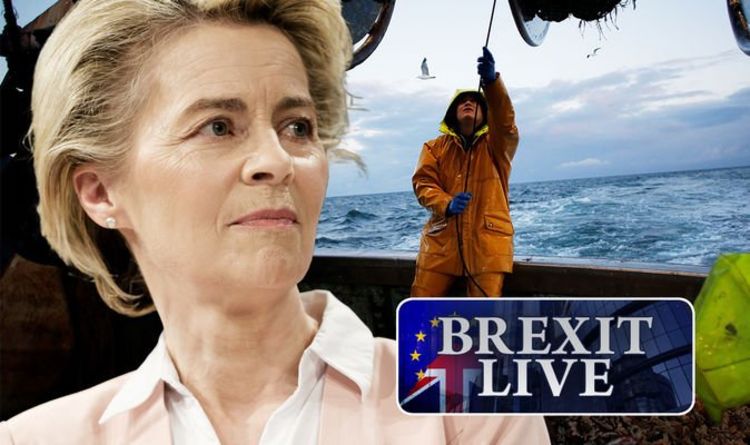Boris Johnson ‘sacrificed fishing industry’ says June Mummery
When you subscribe we will use the information you provide to send you these newsletters.Sometimes they’ll include recommendations for other related newsletters or services we offer.Our Privacy Notice explains more about how we use your data, and your rights.You can unsubscribe at any time.
As the impact of the UK’s exit from the EU becomes clear, Ireland has hit out in the face of a loss of £37m worth of fishing quotas per year. The Minister for Agriculture Food and the Marine, Charlie McConalogue, has now called on the European Commission and other EU Member States to find a more “equitable solution” to the distribution of quotas.
Speaking at the inaugural meeting of the new Seafood Sector Taskforce, Mr McConalogue said the outcome of the Brexit agreement will lead to an eye-watering loss every year for Ireland’s fishing sector.
He said: “The outcome of the Trade and Cooperation Agreement will lead to a loss of €43m (£37m) per year in fish quotas for our fisheries sector, with knock-on effects on marine support industries and our coastal communities.
“The quota reductions in some of our most important stocks will be felt immediately by our fishing industry when the full annual EU quotas for 2021 are determined shortly.
“The impacts for Ireland’s fishing sector are disproportionate compared to other Member States and I again call on the Commission and other Member States to find a more equitable solution to the quote transfers to the UK.”
Mr McConaloque added: “I can assure this Task Force that the Government will work to ensure that the fisheries sector, and the coastal communities that depend on it, are supported through the period ahead.
“The work of this Task Force will inform funding priorities for the coming years under my Department’s Seafood Development Programme 2021-27 and under the Brexit Adjustment Reserve.”
Sean O’Donoghue, chief executive of Killybegs Fishermen’s Organisation, said the Irish fishing industry was “not interested” in compensation and simply wanted some of its fish back.
He said “there is turmoil right around the coast in relation to this” and called for “burden-sharing” by other EU states.
Ireland’s post-Brexit fishing struggles also led to a row between Dublin and Paris over the EU’s Brexit Adjustment Fund – designed to help nations hardest hit by the UK’s withdrawal.
Disagreements over fishing between member states resulted in tension during negotiations over the £4.2billion pot.
Fishing was one of the sticking points during negotiations between Prime Minister Boris Johnson and the bloc.
Under the Brexit deal, signed in December, EU boats will continue to fish in UK waters but British vessels will get a greater share of the fish caught.
The shift in the share will be phased in between 2021 and 206, with most of the quota transferred in 2021.
SEE BELOW FOR LIVE UPDATES…
8am update: EU blasted over claims Britain ‘outright’ banned jab exports – ‘Imagined community’
The EU has been criticised by a business expert who hit back at the European Council President Charles Michel’s claims Britain had “outright” banned exports of vaccines produced on its territory.
Business journalist Allister Heath denounced the European Union’s “refusal” to see Britain’s victory in the vaccine race.
Writing in the Telegraph, he likened Mr Michel’s ban claims to “imagined community,” a concept developed by political scientist Benedict Anderson.
7.45am update: BBC Newsnight: MEP warns Scotland rejoining EU will have ‘consequences’ for bloc
Scotland rejoining the EU would have “wide ranging implications” if they were to apply for membership as an independent nation, according to a Catalan separatist MEP.
Professor Clara Ponsatí appeared on yesterday’s BBC Newsnight to discuss Spain’s crackdown on pro-independence movements in Catalan.
When asked by Emily Maitlis whether Scotland would be welcomed to the EU, the MEP suggested it would be “a simple case”.
In the interview, Prof Ponsatí said an independent Scotland joining the EU could be significant for Catalan and other states calling for independence.
Source: Read Full Article



